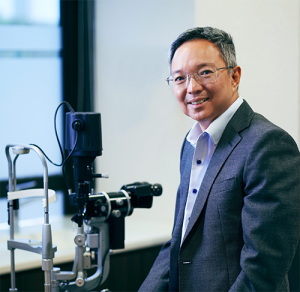As you age, you may notice changes in your body that affect how you experience day-to-day life. In some cases, this can be vision changes, where you may have a hard time seeing things from afar or nearby. One of these conditions that develops with age is presbyopia.
Presbyopia occurs when the eye loses its ability to focus on nearby objects. The natural lens in our eye becomes less flexible as we age, which makes it harder to adjust and focus. This eye condition typically begins at around 40 years old, so if you’ve found yourself holding a book or your smartphone further away to read it, presbyopia might be the cause.
A few of the ways to ensure your safety while living with presbyopia and slow down its progression are by consulting an eye doctor and learning more about the condition through your own research. When researching presbyopia, it’s essential that you learn how to discern which pieces of information are myths or facts.
Busting the Myths of Presbyopia
Understanding presbyopia is crucial, especially when there’s a deluge of misinformation. Let’s debunk some of these myths together.
Myth 1: Farsightedness and Presbyopia Are the Same
Though they seem similar, farsightedness (hyperopia) and presbyopia are distinct. Farsightedness is a refractive error caused by the eye’s shape, where distant objects can be seen more clearly than nearby ones. A person with hyperopia has a shorter than normal eyeball, which is the cause of the condition. On the other hand, presbyopia is a result of the eye lens losing flexibility from the natural ageing process. However, it’s possible to have both conditions simultaneously.
Myth 2: LASIK Can Cure Presbyopia
While many ask about LASIK for presbyopia, hoping for a quick fix, the procedure primarily corrects refractive errors like myopia (nearsightedness), hyperopia, or astigmatism. Furthermore, it is an ineffective and unsatisfying solution for the correction of presbyopia. More often than not, presbyopia treatment involves bifocal or progressive spectacles or presbyopia-correcting lens implants. However, when the presbyopia case is severe, and cataracts start to develop as well, there are instances where the eye specialist will recommend surgery.
Read more: How to know if you need to see a cataract specialist
Myth 3: Wearing Glasses Will Make Your Vision Worse
This long-standing myth has caused many to resist wearing glasses out of fear they’ll become dependent on them or that their eyes will weaken. But as a matter of fact, glasses for presbyopia correction simply help your eyes focus better. These glasses are tailor-made to assist the eye in focusing on objects, particularly those up close. They don’t weaken the eyes or exacerbate the condition. If you feel your vision is deteriorating, it might be time for a presbyopia eye test to adjust your prescription.

Myth 4: Only Old People Get Presbyopia
While age is a significant factor, presbyopia can start as early as your early 40s. Genetics can also influence when one starts to experience presbyopia. If your parents or grandparents needed reading glasses at an earlier age, there’s a chance you might too. Additionally, certain health conditions, such as diabetes and cardiovascular diseases, and even environmental factors can expedite the onset of presbyopia. As such, it’s important to undergo eye screenings to detect early signs of presbyopia or other eye diseases.
How EyeWise Vision Can Help Patients with Presbyopia
EyeWise Vision understands the challenges that individuals face when dealing with presbyopia. That’s why our commitment to helping patients with presbyopia begins with our team of skilled and dedicated Singapore eye doctors. Our specialists possess extensive knowledge and experience in diagnosing and managing presbyopia, ensuring that you receive quality care. They conduct comprehensive eye examinations, allowing them to accurately assess the extent of your presbyopia. This personalised approach enables them to tailor solutions that are specific to your condition and lifestyle.
We believe that addressing presbyopia is not a one-size-fits-all solution and understand that every patient has varying needs. Therefore, our team works closely with you to develop a customised presbyopia treatment plan that may involve prescription eyeglasses, contact lenses, or other advanced vision correction options. Moreover, we strive to enhance your overall quality of life by empowering you with the tools and knowledge to manage your condition effectively. With us, you get the support and care you need to navigate the challenges of presbyopia and enjoy improved vision and a better quality of life.
To further your knowledge of other eye conditions, check out our insights on glaucoma and how to prevent digital eye strain.

Dr. Christopher Khng, specializes in Complex Cataract and Anterior Segment Reconstruction Surgery, in particular, Iris Reconstruction and surgery for Aniridia. His other areas of expertise include Complex Lens surgery, New Lens and Phacoemulsification technologies, Refractive surgery, Phakic IOLs (the Implantable Collamer Lens, ICL), and small-incision, topical anesthesia phacoemulsification cataract surgery. Dr. Khng is a member of the Singapore Medical Association (SMA), a Fellow of the American Academy of Ophthalmology, the American Society of Cataract and Refractive Surgery (ASCRS), and the European Society of Cataract and Refractive Surgery (ECSRS). He is registered with the Singapore Medical Council (SMC) in Singapore and with the General Medical Council (GMC) for practice in the United Kingdom.

